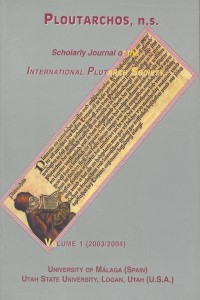Please use this identifier to cite or link to this item:
https://hdl.handle.net/10316.2/37572| DC Field | Value | Language |
|---|---|---|
| dc.contributor.author | Fiorio, Maria Di | - |
| dc.date.accessioned | 2015-10-21T10:32:49Z | |
| dc.date.accessioned | 2020-10-04T22:27:45Z | - |
| dc.date.available | 2015-10-21T10:32:49Z | |
| dc.date.available | 2020-10-04T22:27:45Z | - |
| dc.date.issued | 2003 | - |
| dc.identifier.issn | 0258-655X | - |
| dc.identifier.uri | https://hdl.handle.net/10316.2/37572 | - |
| dc.description.abstract | Some literary essays are listed from No. 119 to No. 123 in the Catalogue o f Lamprias. In particular, there is a lost treatise of literary criticism -whose we have a compendium- on a comparison between Aristophanes and Menander, in which Plutarch praises the poet of the New Comedy (No. 121: Aristophanis et Menadri Comparatio). This work wants to search into the cause of the writer’s preference and it examines his ideas of ‘vis comica’. At first, Plutarch points out the style, then he examines the contents of the plays and he always prefers Menander. His φράσις is polished and suits many characters in spite of Aristophanes, who stuffed his plays with too many figures of speech. Moreover, Menander is right on every occasion, at school, at theatre, at symposium, whereas Aristophanes likes to show on the stage arrogance, intemperance and malice and he is unpleasant. Anyway, beyond the plays on words and the vulgarity, Plutarch seems to blame the wit of Aristophanes, because it is unprejudiced and useless; Menander, on the contrary, has a very kind sense of humour, and in his plays the life of the times is reflected somewhat. So, Plutarch’s judgement reflects a careful theory. To make good comedies it is necessary to keep two main criteria, the πρέπον and the πιθανόν: every character has to have a proper diction and ‘convenient’ manners, so that it is trust-worthy. Therefore, Plutarch rejects Aristophanes because he shows unlikely or improbable events and everything he ‘imitates’ is worse than it is. Also Menander’s language is better and it doesn’t carry its Atticism too far. Finally, Menander’s plays are very usefull to educate young people and they have an ethic power, which sometimes is almost cathartic. | eng |
| dc.language.iso | ita | - |
| dc.publisher | International Plutarch Society | - |
| dc.rights | open access | - |
| dc.title | L’estetica del comico e la Aristophanis et Menandri comparat | por |
| dc.type | article | - |
| uc.publication.collection | Ploutarchos vol. 1 | - |
| uc.publication.firstPage | 21 | - |
| uc.publication.lastPage | 34 | - |
| uc.publication.location | Málaga | - |
| uc.publication.location | Utah | - |
| uc.publication.journalTitle | Ploutarchos | - |
| uc.publication.volume | 1 | por |
| dc.identifier.doi | 10.14195/0258-655X_1_2 | - |
| uc.publication.section | Articles | - |
| uc.publication.orderno | 5 | - |
| uc.publication.area | Artes e Humanidades | - |
| uc.publication.manifest | https://dl.uc.pt/json/iiif/10316.2/37572/268552/manifest?manifest=/json/iiif/10316.2/37572/268552/manifest | - |
| uc.publication.thumbnail | https://dl.uc.pt/retrieve/12140471 | - |
| item.grantfulltext | open | - |
| item.fulltext | With Fulltext | - |
| Appears in Collections: | Ploutarchos | |
Files in This Item:
| File | Description | Size | Format | |
|---|---|---|---|---|
| l_estetica_del_comico_e_la_aristophanis_et_menandri_comparatio.pdf | 34.08 MB | Adobe PDF |  |
Items in DSpace are protected by copyright, with all rights reserved, unless otherwise indicated.
